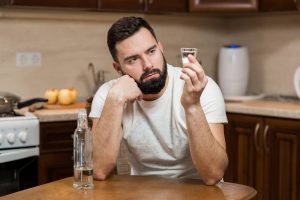From The Fix: Is Addiction a Disease or a Choice?
By Derek Hobson

I was 3 weeks sober when I found the hand sanitizer at work. The scent was familiar and I ended up spritzing a gob into my palm and licking it off–it tasted like a little drop of heaven.
Man examining shot glass.
As a recovering alcoholic, this has been a major question in my life, and I’ve struggled with the answer. On the one hand, I’ve had people tell me I make a “choice” every day and to say it’s a disease minimizes people who suffer from Alzheimer’s or cancer (yes, really).
On the other hand, I know that when I drink a beer, I lose the ability to say no to another and another and another…
So Where Does That Leave Me?
Contrary to other alcoholics I’ve known, I came to the realization I had a problem despite friends telling me otherwise. My friends didn’t believe I had a problem. Or rather, they thought if I had a problem, we must all have a problem. We’d go out, we’d drink; we’d stay in, we’d drink; we’d wake up, we’d drink. It may have been that we were lonely; it may have been that we never conquered the college mindset; or it may have been that we worked on a tall ship performing 1830s reenactment programs for children as scurvy seadogs. Whatever the reason, we drank heavily often, and then some.
But a difference I started to notice is I’m a bit of a night owl. While my friends knew when to call it a night, I’d stay up and I’d keep drinking. I didn’t think it odd that I was drinking alone, but in hindsight, this should’ve been my first clue. Meanwhile, we’d go to movies, a party, or to a play and I’d make sure there was a bar open or that I had a 12 pack for the trip. It wasn’t until they started to recall events I didn’t remember that I started to get suspicious.
“Remember when you took off in the long boat to try and jar some phosphorescent algae?” They’d laugh and I’d laugh assuming they were trying to pull a fast one. Except the “remember” stories kept coming up and it wasn’t until I had a vague recollection of one that I started to panic. They weren’t making it up, I was doing things and not remembering.
I had assumed we were all drinking the same amount, yet somehow they had better memories? It didn’t make sense and I started to do some digging as a result. Of course, when self-diagnosing yourself online, there’s a myriad of possibilities. The problem with addiction is that it’s pretty apparent what’s causing the symptoms.
I started talking to my friends about this and they were incredulous. I was being overdramatic and to a certain extent, I thought they might be right. So I vowed to quit, to prove to myself I didn’t have a problem. I had a few “false starts” as I call them, but eventually hit a stride. I was three weeks sober… and then during a work day, I found the hand sanitizer and gave myself a little spritz to clean my hands when I caught a whiff of a familiar scent. I ended up spritzing another gob into the palm of my hand and proceeded to lick it off – it tasted like a little drop of heaven. So I frequented the hand sanitizer station and continued to be “sober” for another week and a half before I finally realized that I had relapsed and I definitely had a problem.
Long story short, I got help. I got sober. But more than that, I researched. I wanted to know what made me different from my friends (who do not struggle with addiction – believe it or not – and drink significantly less now). Here’s what I found.
Is Addiction a Disease or a Choice?
Technically? Neither. Or as Dr. Marc Lewis (developmental neuroscientist, professor of developmental psychology, and much smarter than I’ll ever be) is wont to point out, it’s a “false dichotomy.” The bottom line is neither definition is right. A disease implies that it’s irreversible without treatment and doesn’t take our brain’s natural ability to adapt and form new connections into account. Meanwhile, to say it’s a choice indicates that rational and conscious thought are applied which is equally erroneous since the brain has a chemical imbalance when you have an addiction, effectively making rational thought impossible.
So How Do You Classify Addiction?
I’m not sure there is a perfect way, but the best alternative I’ve found is re-education. Because being a “recovering alcoholic” is not something I’m ashamed of – and it’s easier to do the more I read about it – but there seems to be a universal misunderstanding about addiction. Some of my peers who have struggled with addiction have told me it’s 100% a choice while others vehemently argue it’s a disease. So where I usually start is with Daniel Kahneman.
To this day, I’m still amazed that Daniel Kahneman isn’t more talked about in the sober living community. He won a Nobel Peace prize in economics, survived a run-in with a German soldier after curfew in Nazi-occupied France, and continues to be one of the most influential economists in the world (#7 as of 2015). He’s a legitimate thought leader and has changed the way most of us think of thinking. For instance, my understanding is that prior to Kahneman, people mostly thought we were rational human beings, but Kahneman nixed that idea in favor of “dual process” brain functions.
Daniel Kahneman eventually went on to publish this research in a book, but the idea is that we have two thought functions: conscious and unconscious; deliberate and impulsive; slow and fast. At the very beginning of his book, he gives two examples of either side in action. For the “unconscious,” he presents a picture of a disgruntled woman. Immediately, our brains register she’s in a bad mood and we know to react appropriately to suit the situation. If we know the person well, we may want to disarm them with a joke, but if they’re a stranger, we know to steer clear. These are automatic responses that don’t require slow thought, they’re impulsive.
In the second example, Kahneman provides a math problem, something like “17 * 29”. We don’t know off-hand what it is. And, most of us would take out a pen and paper to start working through the problem slowly, deliberately.
We need both halves of the brain to function, but in the beginning of an addiction, a chemical imbalance starts to occur. The fast, impulsive brain starts to be rewarded. In fact, it starts to feed off the instant gratification since it doesn’t require conscious thought. And it’s why we can’t simply “stop.” If you can stop, you’re using deliberate thought. You’re thinking of the consequences; of what will happen if you drink more; of going into work the next day; of what you ate that day and if you should get some food on the way home. If you have addiction, the impulsive thought process has taken hold, meaning the only thing we’re thinking of is immediate: “my glass is empty, I need to get another one.” There is no thought process of “what will this do to me,” only what is present.
Because of this, people with addiction continue to feed one part of their brain, creating a substantial imbalance between the two. Recovery is about leveling the two out again. This is also why it gets easier with time. But it’s this immediate gratification that leads to the unconscious thought dominating and why it’s so hard to quit.
For anyone who still doesn’t understand that, I use the analogy, “would anyone smoke pot if the enjoyable effects didn’t happen for 10 years?” No. Of course not. Samuel Butler put it another way: “If the headache would only precede the intoxication, alcoholism would be a virtue.”
Today, I’m thankful for my station in life with good friends, supportive family and a job I love. It’s always a long road ahead, but I’m thankful for the steps I took to get here and hope I can help continue to learn and educate others on the addiction disease/choice misconception.

